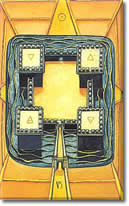 «Know Thyself» was the warning written at the entrance of the Temple of Delphi. This is still a fundamentally important idea. The knowledge of ourselves starts with understanding what we think, what we think about ourselves and why. «Know Thyself» was the warning written at the entrance of the Temple of Delphi. This is still a fundamentally important idea. The knowledge of ourselves starts with understanding what we think, what we think about ourselves and why.
From knowledge to mental liberation, stage 2
Knowing ourselves to understand ourselves
«Know Thyself» was the warning written at the entrance of the Temple of Delphi. This is still a fundamentally important idea. The knowledge of ourselves starts with understanding what we think, what we think about ourselves and why. Thinking about ourselves, what we think and feel towards any subject, becomes a kind of «school of whys»; it is necessary to realize who (inner essence) and what (role) we can become during the cycles of life.
The importance of asking ourselves questions
 The theory that in every perfect question there is the right answer to the dilemma is commonly accepted. Therefore it is important to ask good questions, in order to obtain good answers. The better the questions are formulated, the more complete the answers will be. Without contradicting the past, modern science calls this ability geometry of thought. The theory that in every perfect question there is the right answer to the dilemma is commonly accepted. Therefore it is important to ask good questions, in order to obtain good answers. The better the questions are formulated, the more complete the answers will be. Without contradicting the past, modern science calls this ability geometry of thought.
In the same way that chaotic sounds confuse the mind and harmonious sounds exalt its spirit, also the confused idea ruins the mind and the perfect answer enriches it.
It is possible to understand the level of the interlocutor from the quality of his questions, not only from his answers. A question guides an answer and the latter guides the following question. It is understandable, then, why it is so important to be clear and precise in asking and answering. Everybody should feel the responsibility of this task. Communication, especially when it is aimed at divulging, can’t accept imprecise questions because this would force the trivialization of the essence of the answers. A thinker is a man who reflects on his own questions and looks for answers inside himself, able to evaluate the correctness of both. The purpose of a safe guide is to stop the process of fantastic speculations.
Athos A. Altomonte
| 

